|
|
|
Sort Order |
|
|
|
Items / Page
|
|
|
|
|
|
|
| Srl | Item |
| 1 |
ID:
126676
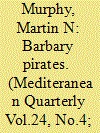

|
|
|
|
|
| Publication |
2013.
|
| Summary/Abstract |
This essay describes the piracy that took place in the Mediterranean from the time of ancient Greece to Barbary. It explains the corso, the sea war between nonstate but state-endorsed Christian and Muslim parties, with reference to the Knights of Malta and, more extensively, the Barbary corsairs. Although the essay focuses primarily on history, it also draws some conclusions about piracy and the international system today. The essay notes a prevailing assumption that contemporary piracy off Somalia and that perpetrated by the Barbary pirates is similar, but it further notes that any similarities are slight and superficial. At the same time, similarities rooted in economic, social, and political change do exist between all outbreaks of depredation at sea and the responses to them.
|
|
|
|
|
|
|
|
|
|
|
|
|
|
|
|
| 2 |
ID:
121960
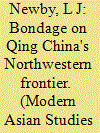

|
|
|
|
|
| Publication |
2013.
|
| Summary/Abstract |
Despite the extensive literature on global slavery and servitude, human bondage in Xinjiang (Eastern Turkestan) during the eighteenth and nineteenth centuries has been largely neglected. Here bondage did not discriminate between ethnic, racial or religious groups and fulfilled a wide range of social, economic, and political functions, reflecting both the region's geographical position at the edge of Central Asia and its political position-first as a dependency and then as a province of Qing China. This paper discusses the nature of the forms of bondage that emerged in this unique geopolitical setting and suggests that the emancipation of Xinjiang's 'British' slaves at the end of the nineteenth century and the gradual decline of bondage resulted from a convergence of local, regional, and global forces.
|
|
|
|
|
|
|
|
|
|
|
|
|
|
|
|
| 3 |
ID:
140013
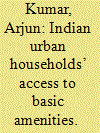

|
|
|
|
|
| Summary/Abstract |
The need for access to basic amenities—drinking water, sanitation, electricity and drainage—to ensure a decent quality of life has been internationally and nationally recognised and acted upon in the form of Millennium Development Goals (MDGs) and various policies and programmes in India. Deprivation and disparities in access to basic amenities in urban India have been highlighted in this article, using data from Census 2001 and 2011 and National Sample Survey’s (NSS) Housing Conditions Rounds unit records data 1993 and 2008–09. Determinants of households having access to basic amenities in the house have been estimated using an econometric exercise on household-level information (NSS, 2008–09). Despite improvement over time, many households in urban India still face deprivations of basic amenities and, hence, low standard of living. Households located in slums and small and medium towns/cities and those belonging to Poor, Scheduled Tribe, Scheduled Caste and Wage Labourers (Casual Labourers) groups were highly deprived of access to basic amenities, and disparities among various socioeconomic groups were observed to be increasing. Findings suggest the need for urgent attention for providing basic amenities, focused on slums, small and medium towns/cities and supplemented with inclusive, group-specific measures in order to raise the overall quality of life and well-being.
|
|
|
|
|
|
|
|
|
|
|
|
|
|
|
|
| 4 |
ID:
123612
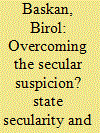

|
|
|
| 5 |
ID:
128219
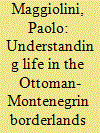

|
|
|
|
|
| Publication |
2014.
|
| Summary/Abstract |
The paper reconsiders the development of decentralization/centralization dynamics during the Ottoman Empire, focusing on the Ottoman-Montenegrin borderlands of Northern Albania with particular reference to the Mirdite territory inhabited by Catholic tribes. First, the paper describes the local socio-political system and balance of power in Mirdite territory before the enactment of the Gulhane decree. Secondly, the paper focuses on the developments and changes occurring in this land during the Tanzimat. Interaction, intertwining and overlapping between different strategies and policies are analysed in regard to the relationship between Catholic tribes, missionaries and Ottoman officials. Because of them, the changes and developments in the local administrative system occurring in both the religious and the political dimensions during the last part of the nineteenth century were expressions of the process of decentralization/centralization triggered by Istanbul from the third decade of the nineteenth century on.
|
|
|
|
|
|
|
|
|
|
|
|
|
|
|
|
|
|
|
|
|